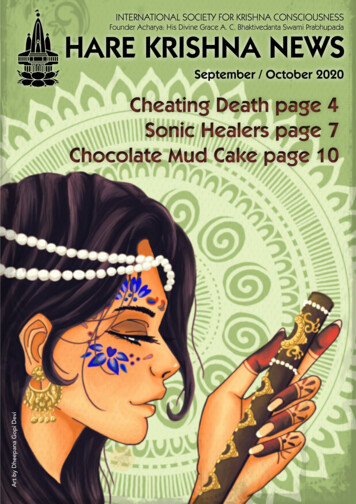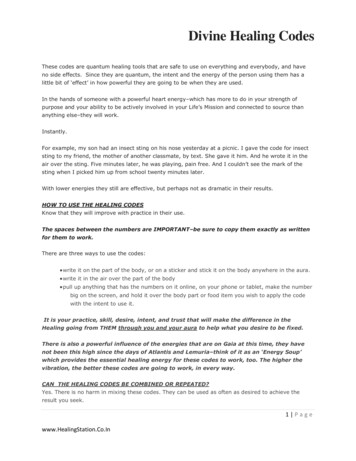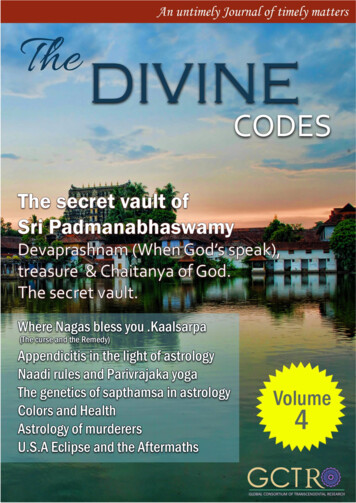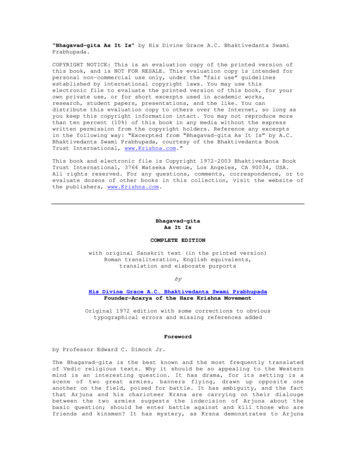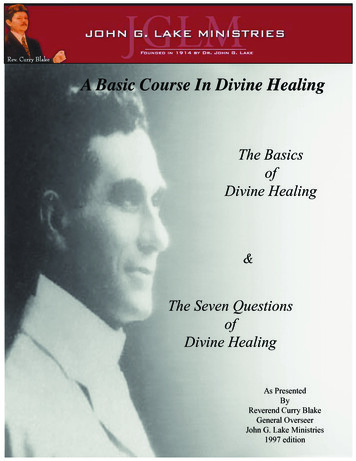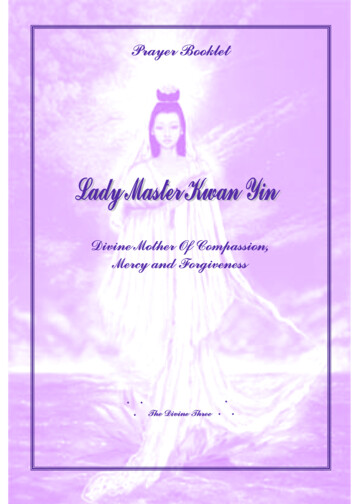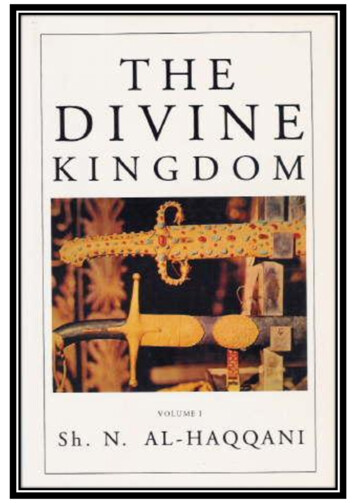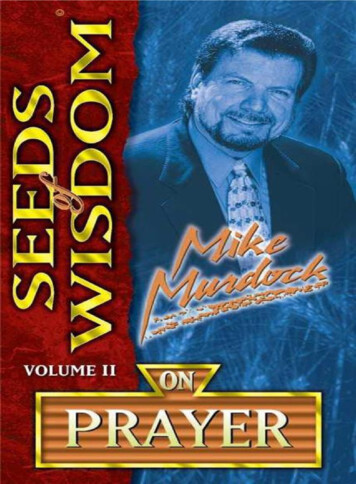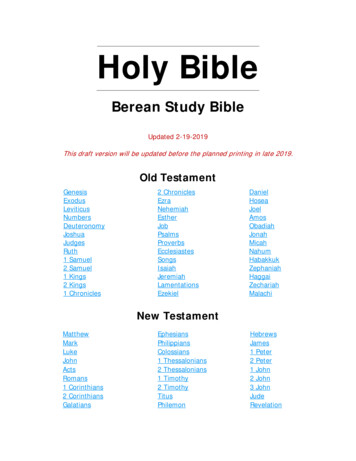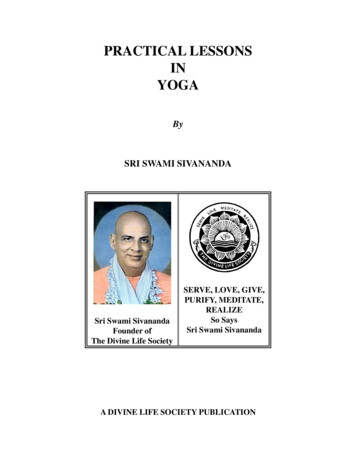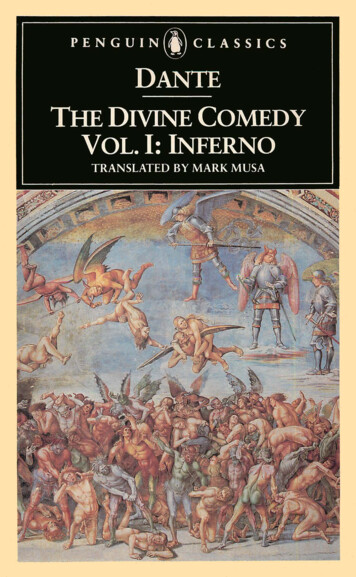
Transcription
PE;-.;GUJN CLASSICSDANTE ALIGHIERI was born in Florence in I265 and belonged to a noblebut impoverished family. He followed a normal course of studies,possibly attending university in Bologna, and when he was abouttwenty, he married Gemma Donati, by whom he had several children.He had first met Bice Portinari, whom he called Beatrice, in I274,and when she died in I290, he sought distraction by studying phi losophy and theology and by writing La Vita Nuova. During this timehe became involved in the strife between the Guelfs and the Ghibel lines; he became a prominent White Guelf, and when the Black Guelfscame to power in I 302, Dante, during an absence from Florence, wascondemned to exile. He took refuge first in Verona, and after wan dering from place to place--as far as Paris and even, some have said,to Oxford-he settled in Ravenna. While there he completed TheDivine Comedy, which he began in about I 308. Dante died in Ravennain IJ2!.MARK MusA is a graduate of Rutgers University (B.A., I956), theUniversity of Florence (Fulbright, I956-58), and the Johns HopkinsUniversity (M.A., I959; Ph.D., I96I). He is a former Guggenheimfellow and the author of a number of books and articles. Best knownfor his translations of the Italian classics (Dante and the poetry of theMiddle Ages), he is Distinguished Professor of French and Italian atthe Center for Italian Studies, Indiana University. Mr. Musa and PeterBondanella have translated and edited Tile Portable Machiavelli, alsopublished by Penguin Books.
DANTE ALIGHIERITHE DIVINECOMEDYVOLUME IINFERNOTRANSLATED WITH AN INTRODUCTION,NOTES, AND COMMENTARY BYMARK MUSAPENGUIN BOOKS
PENGUIN BOOKSPublished by the Penguin GroupViking Penguin Inc., 40 West 2.3rd StreetNew York, New York 10010, U.S.A.Penguin Books Ltd, 2.7 Wrights Lane,London W 8 sTZ, EnglandPenguin Books Australia Ltd, R.ingwood,Victoria, AustraliaPenguin Books Canada Ltd, 2.8 01john Street,Markham, Ontario, Canada L3R IB4Penguin Books (N.Z.) Ltd, 182-190 Wairau Road,Auckland 10, New Zealand,Penguin Books Ltd, Regi stered Offices:Harmondsworth, Middlesex, EnglandThis translationfirst publishedin the United States of Americaby Indiana University Press1971First published in Canada byFitzhenry & Whiteside Limited 1971a new Introduction,with revisions 1984Published in The Penguin Classics withGlossary, and Selected Bibliography and7 910 8Copyright Indiana University Press,1971Introduction and Glossary and Index of Personsand Places copyrightAU Mark Musa,1984rights reservedLIBRARY OF CONGRESS CATALOGING IN PUBLICATION DATADante Alighieri,U6S-1321.The divine comedy.(Penguin classics)Translation of: Divina commedia.Bibliography: p.Includes ir:dex.Contents: v. I. Inferno.PQI. Musa, Mark. II. Series.4315.M8 1984851'.183-17423ISBN o 14 044.441 6Printed in rhe United States of AmericaSet in Linotron BemboDiagrams and maps drawn by C.W.Scott-Giles
FORISABELLANel mezzo del cammin di nostra vita
The subject of this work must first be considered according to theletter, then be considered allegorically. The subject ofthe whole work,then, taken in the literal sense alone, is simply " The state of soulsafter death, " for the movement of the whole work hinges on this. Ifthe work be taken allegorically, the subject is "Man-as, accordingto his merits or demerits in the exercise of his free will, he is subjectto reward or punishment by Justice. . . .The title of the work is "Here begins the Comedy of DanteAlighieri, Florentine by birth, not by character. "DANTE's Letter to Can Grande"
C O N TE N T SAcknowledgments13An Introduction to Dante and His Works15Translator's Note: On Being a Good Lover57Canto ICanto IICanto IIICanto IVCanto VCanto VICanto VIICanto VIIICanto IXCanto XCanto XICanto XIICanto XIIICanto XIVCanto XVCanto XVICanto XVIICanto XVIIICanto XIXCanto XXCanto XXICanto XXIICanto XXIIICanto XXIVCanto XXV677989971091211291381471581 681 761 8619620521422323 123925 1260268277288297
10THE DIVINE COMEDY: INFERNOCanto XXVICanto XXVIICanto XXVIIICanto XXIXCanto XXXCanto XXXICanto XXXIICanto XXXIIICanto XXXIV305315325335343353362370379Glossary and Index of Persons and Places3 89Selected Bibliography429
L I S T O F D IA GR A MSA N D MA P SSection of the Earth66Map of Upper Hell, Circles I to V88Map of Lower Hell, Circles VI and VII148Section-Map of Hell1 72Map of Lower Hell, Circle VIII232Bridge over Bolgia 324 1Font in Baptistery at Pisa24 1Diagram to Illustrate Canto XXIV, 34-3 5290Map and Sketch of Lower Hell, Circle IX352
A C K N O WL E D GME N T SI should like to acknowledge my gratitude to all the studentsin my Dante classes at Indiana University for the past nineyears, whose comments I often found helpful in the prepa ration of my notes, and especially to Christopher Kleinhenzand Charles Jernigan (now professors), Denise Heilbronn andJudith Sherrington, who served in various ways as my researchassistants; and to Indiana University's Office of Research andAdvanced Studies for a number of very helpful grants. I amalso indebted to Rudolph Gottfried and Gene Lawlis, profes sors in the English Department of this university, for valuablesuggestions concerning the translation and the notes. And manythanks to Bernard Perry, the director of the Indiana UniversityPress, for his courage and encouragement and for giving mean editor with the splendid talents of Dorothy Wikclund.And to Anna Hatcher, my severest critic.Special thanks to Georges Edelen, several of whose sug gestions I have incorporated into this new Penguin edition,and to Peter Bondanella and Jim Jensen, who made suggestionsfor the Introduction. Thanks to Nancy Kipp Smith for herhelp with the Glossary and to sweet Sandy Claxon, who typedand typed and typed.
A N I N T R O D UC T I O N T OD A N TE A ND H I S W O R K SNoTMUCH is known about Dante Alighieri. W e know hewas born in Florence sometime in late May or early June (hewas a Gemini) of the year 1 265 in the district of San Martino,the son of Alighiero di Bellincione d'Alighiero. His mother,Donna Bella, died when he was very young; his father, whomhe seems to avoid mentioning as much as possible, remarried,and died while Dante was in his late teens. The Alighieri familymay be considered noble by reason of the titles and dignitiesbestowed upon its members, although by the time Dante ar rived on the scene the family seems to have been reduced tomodest economic and social circumstances. According to Dantehimself in Inferno XV, the family descended from the nobleseed of the Roman founders of the city. This claim, however,remains largely unsubstantiated, as nothing is known of Dante'sancestors before his great-great-grandfather Cacciaguida, whowas knighted by Emperor Conrad III. In the company ofCacciaguida Dante spends several emotional cantos in the finalpart of the great poem: they are cantos that occupy the centralportion of the Paradise, in which important questions are an swered, tragic events are revealed, and major themes runningthrough the entire Divine Comedy are resolved. Cacciaguidadied, or so Dante tells us in Paradise XV ( 1 3 9-48), during theSecond Crusade, about I 1 47.Like most of the city's lesser nobility and artisans, Dante'sfamily was affiliated with the Guelf party, as opposed to theGhibellines, whose adherents tended to belong to the feudalaristocracy. These two parties came into Italy from Germany,and their names represent Italianized forms of the names at tached to the two rival German clans of Welf and Waibling.In Italy, the parties were at first identified with broad aile-
16THE DIVINE COMEDY: INFERNOgiances: to papal authority for the Guelfs, and to imperialauthority in the case of the Ghibellines. Eventually, however,this distinction between Church and Empire disappeared, andthe two parties became less clearly defined in outlook andpurpose. Local connotations became much more important,as party issues and activities were tied to neighborhood ri valries, family feuds, and private interests. Thus, the Guelfsand Ghibellines of Florence were in a sense factions peculiarto that region alone.One year after Dante's birth the Guelfs gained control inFlorence: 1 266 marks the beginning of nearly thirty years ofrelative peace and prosperity in the city. Florence was flour ishing at this time, artistically, intellectually, and commer cially; according to a contemporary chronicler, Dino Compagni,Florence could even boast of a tourist trade. The city, com posed of old and respectable, wealthy families as well as thenouveau riche, was certainly one of the wealthiest of its day.Founded on banking and the gold florin, it thrived on themanufacturing of silk, fur, leather, and especially wool. An other chronicler, Giovanni Villani, reports that there were asmany as two hundred shops, or botteghe, belonging to the woolguild (which employed thirty thousand people) and as manyas eighty banks in town. By this time the Florentine bankingfamilies, most prominent of whom were the Bardi and thePeruzzi, had become international leaders in the field ofbanking.Like every good male citizen of Florence, Dante did hismilitary service. In 1 289 he joined the cavalry, the aristocraticbranch of the armed forces, and in the summer of that year,when Florence and its Guelf allies were at war with the neigh boring town of Arezzo, Dante took part in the battle of Cam paldino, which ended in a decisive victory for Florence. Lateron, in August, he was at the siege of the Pisan fortress ofCaprona. He records both experiences in The Divine Comedy:Campaldino in Purgatory V, through the eyes ofthe courageousBuonconte da Montefeltro, who dies in that battle; and thesurrender of Caprona's fortress in Inferno XXI.lf l were asked to quote a passage that best describes Dante's
INTRODUCTION17feelings about war in general, I might turn to the opening linesof Inferno XXII for their color and force and pageantry, butmy final choice would be to quote the closing lines of CantoXXI, for the first five tercets of the next canto are simply agloss on them. Mala coda, the devil-captain in charge of affairsin the Fifth Bolgia, which houses the corrupt souls of the Graft ers, who misused public office, orders ten of his best devilsto accompany the Pilgrim and his guide, Virgil, to the archwaycrossing the Sixth Bolgia. There is no archway, but only thecaptain and his men know that, and they are about to takeadvantage of the fact by having a little fun with their innocentwards; the canto ends with the black squadron of ten salutingtheir honorable captain just as they are about to take off:Before they turned left-face along the bankeach one gave their good captain a salutewith farting tongue pressed tightly to his teeth,and he blew back with his bugle of an ass-hole.So much for war!As far as one can tell from his writings, Dante's recollectionsof family life were pleasant ones. It is fairly certain that hereceived a careful education, although little of its content isprecisely known. He may have attended the Franciscan lowerschools, and later the order's schools of philosophy. The fam ily's modest social standing did not prevent him from pursuinghis studies, nor was he hindered in his effort to lead the lifeof a gentleman. His writings indicate that he was familiar withthe ways of the country as well as with city life. He probablystudied for a time under the direction of the distinguishedteacher, scholar, and statesman Brunetto Latini (c. 1220--94 ),who was the author of an encyclopedia in French, the Tresor,a work well known all over Europe. At this time Dante wasdriven by a desire to master the techniques of style. It seemsthat Brunetto encouraged his keenness for study and learning,and this may account for a trip, around 1 287, to Bologna,where Dante decided to pursue his study of rhetoric in thehighly renowned university.
ISTHE D IVINE COMEDY : INFERNOWe learn from the Vita nuova (Chapter III) that as a youngman Dante taught himself the art of writing verse. In time,he became acquainted with the best-known poets of Florence,corresponding with them and circulating his own love lyrics.For the youthful Dante, writing poetry gradually became animportant occupation, nourished by his love for art and learn ing and his interest in the nature of genuine love courtship.Equally significant at this time was his friendship with thewealthy, aristocratic poet Guido Cavalcanti (c. 1 24cr- I 300),who exerted a strong influence on Dante's early poetic en deavors. This period was also marked by the death ofhis father(c. 1 283), and by his marriage to Gemma, a gentlewoman ofthe Donati family. (The marriage had been arranged by Dante'sfather in 1 277, well before his death.) Gemma gave Dante twosons, Pietro and Jacopo, and at least one daughter (there existthe names of two daughters, Antonia and Beatrice, but theycould refer to the same person, Beatrice being a monasticname). Dante's marriage and family seem to have had littleinfluence on him as a poet; some critics believe that during hislast years of life in exile, Gemma joined him in Ravenna andwas a comfort to him, but nowhere in his works does Dantemake reference to his wife.Besides his associations with Guido Cavalcanti and BrunettoLatini, Dante knew well the notary Lapo Gianni (c. I 27cr I 3 32) and became acquainted later on with the youthful Cinoda Pistoia (c. 1 27cr-c. 1 3 36). Both of these men were poets,and Cino, like Dante, was a highly productive one. Dante wasalso on friendly terms with the musician Casella, who appearsin Purgatory II (76-1 14), and about whom there exists littleinformation. We are not certain, but the artists Oderisi daGubbio (c. 1 24cr-c. 1 299) and Giotto (c. 1 267- 1 3 3 7) may alsohave been among Dante's acquaintances. A comrade chosenwith far less discrimination, perhaps, was Forese Donati(d. 1 296), a kinsman of Dante's wife's and a regular rogue,with whom Dante exchanged at one time a series of reproachesand coarse insults in sonnet form. Dante the Pilgrim's meetingwith his bon vivant friend Forese in the Purgatory (Canto XXIII)precedes a number of conversations in Cantos XXIV-XXVI
INTRODUCTIONI9with the great poets Guido Guinizelli (c. I23o-75) and ArnautDaniel (c. uso-?). And it is here, immediately following histalk with Forese, that Dante the Pilgrim discusses poetry witha not-too-distinguished poet from Lucca, Bonagiunta (c. I22o c. I275). and in so doing gives a definition of the so-calledschool of the dolce stil nuovo.Along with his good friend Guido Cavalcanti, Dante refinedand developed his poetic skill and began to distinguish himselffro m the other writers of the time. In their poetry, Dante andGuido presented their ideas on the nature oflove and its abilityto contribute to the inner perfection of man. Guido, however,was more interested in natural philosophy and the psychologyof love than Dante, who favored the study of theology andLatin poetic models. He particularly admired Virgil, from whomhe learned much about matters of style as well as content.Though Dante was deeply influenced in his writing by theexample of his friend Guido, he eventually responded to hisown artistic temperament, to his study of Virgil, and to theexample provided by a great poetic master, Guido Guinizelli,who died when Dante was just a child.Dante's life and writings were also influenced by his ac quaintance with a noble Florentine woman of outstanding graceand beauty. He casually mentions her name among the namesof sixty of the most beautiful women of Florence in one ofhis early poems, but it was not until later that the poet truly"discovered" her. This revelation proved to be an extremelypowerful force in his artistic development. According to thetestimony of Boccaccio and others, the woman was calledBice, and was the daughter of Folco Portinari of Florence. Shelater became the wife of the banker Simone dei Bardi. Dantecalled her Beatrice, "the bringer of blessings, " the one whobrought bliss to all who looked upon her.Dante tells us that he met Beatrice for the first time whenhe was nine. Some time later they met again, and if we are totake the literal level of what our poet tells us in his Vita nuovaas true (and I see no reason not to), theirs was not an easyrelationship, for Beatrice was offended by the attention Dantepaid other women. The resulting rebuff caused Dante great
20THE DIVINE COMEDY: INFERNOsorrow. His emotional attachment to Beatrice brought him toidealize her more and more as the guide of his thoughts andfeelings, as the one who would lead him toward the innerperfection that is the ideal of every noble mind. In his poems,Dante praised his lady as a model of virtue and courtesy, amiraculous gift given to earth by God to ennoble and enrichall those who were able to appreciate her superior qualities.Such an exalted view of this woman was bound to carry withit the fear that she would not remain long in this life, and, infact, she died at a rather early age in 1290. Dante was overcomewith grief at his loss, and there followed a period of contem plating Beatrice in the full glory of Heaven. After the firstanniversary of Beatrice's death, another woman (unnamed)succeeded in winning Dante's affection for a brief time. How ever, Beatrice soon came vividly to mind again, and, feelingguilt and remorse for having neglected her memory, Dantereaffirmed his fidelity to her. This experience prompted himto gather together all the poems he had written in her honor,in an attempt to celebrate her virtue. To this selective collectionof poems (Dante chose to include thirty-one) he added a com mentary on the meaning and occasion of each, and he calledthe little book Vita nuova, or the New Life.This, the most elegant and mysterious of Dante's earliestworks, is a masterpiece in its own right. Had Dante neverwritten The Divine Comedy, he would undoubtedly still beremembered today for the Vita nuova. In addition to the poems,it includes one of the first important examples ofltalian literaryprose, which serves the purpose not only of offering a con tinuous narrative but also of explaining the occasion for thecomposition of each of the poems. The originality of the Vitanuova lies in the functional relationship between the poetryand the prose. The Vita nuova is, I believe, the best introductionto The Divine Comedy. From this little book the great poemis born, and in it we find Dante's early use of such techniquesas allegory, dream, and symbolism.In recent years the critics of The Divine Comedy have cometo see more clearly the necessity of distinguishing betweenDante the Poet-the historical figure, who wrote the poem in
IN TROD UCTION21his own voice--a nd Dante the Pilgrim, the poet's creation,who moves in a world of the poet's invention. In the case ofthe Vita nuova it is more difficult to distinguish between Dantethe Poet and Dante the Lover, because in this book rhe Lover,the protagonist, is himself a poet. More important, however,is the fact that the events of the Vita nuova, unlike those ofThe Divine Comedy, are surely not to be taken as pure fiction,and the protagonist himself is no fictional character: he is thehistorical character Dante at an earlier age. But we must at tempt, just as we must do in the case of any first-person novel,to distinguish between the point of view of the one who hasalready lived through the experiences recorded and has hadtime to reflect upon them, and the point of view of the oneundergoing the experiences at the time. What we have in theVita nuova is a mature Dante, who is evoking his youthfulexperiences in a way to point up the folly of his youth.Also significant is the chronological relationship betweenthe composition of the poems and that of the prose narrative,which reflects the way in which the author adapted some ofhis earlier writings to a new purpose. In general, scholars willagree that sometime between I292 (that is, two years after thedeath of Beatrice) and 1300, when Dante composed the Vitanuova, most-if not all-of the poems that were to appear inthe text had already been written. The architecture of thework, it might be said, consists of selected poems arranged ina certain order, with bridges of prose that primarily serve anarrative function: to describe the events in the !if of theprotagonist that supposedly inspired the poems included inthe text.By giving the poems a narrative background, the authorwas able to clarify their meaning. For example, though itsbeauty is independent of its position in the work, the firstcanzone in the book, "Donne ch'avete intelletto d'amore"("Ladies who have intelligence of love"), owes entirely to thepreceding narrative its dramatic significance as the procla mation of a totally new attitude adopted by the young poet lover at this time in the story. This is also true, though froma different point ofview, of the most famous poem in the Vita
22THE DIVINE COMEDY: INFERNOnuova (and probably one of the most exquisite sonnets in allof world literature) :Tanto gentile e tanto onesta pareIa donna mia quand'ella altrui saluta,ch'ogne lingua deven tremando muta,e li occhi no l'ardiscon di guardare.Ella si va, sentendosi laudare,benignamente d'umilta vestuta,e par che sia una cosa venutada cielo in terra a miracol mostrare.Mostrarsi si piacente a chi Ia mira,che da per li occhi una dolcezza al core,che 'ntender no Ia puc chi no Ia prova;e par che de Ia sua labbia si movaun spirito suove, pien d'amore,Che va dicendo a !'anima: "Sospira!"Such sweet decorum and such gentle graceattend my lady's greeting as she movesthat lips can only tremble into silence,and eyes dare not attempt to gaze at her.Moving benignly, clothed in humility,untouched by all the praise along her way,she seems to beacreature come from Heavento earth, to manifest a miracle.Miraculously gracious to behold,her sweetness reaches, through the eyes, the heart(who has not felt this cannot understand),and from her lips it seems there moves a graciousspirit, so deeply loving that it glidesinto the souls of men, whispering: "Sigh!"Just how much of the narrative prose is fiction we shallnever know. We can never be sure that a poem actually arosefrom the circumstances outlined in the preceding prose. A fewcritics believe that all of the events of the narrative reflectbiographical truth; most, fortunately, are more skeptical. Butit goes without saying that in reading the Vita nuova we mustsuspend our skepticism and accept as "true" the events ofthe narrative (as we must when we read The Divine
INTRODUCT ION23Comedy), for only by doing so can we perceive the significancethat the author attributed to his poems as he placed them wherehe did.In the opening chapter, or preface, of his little book, theauthor states that his purpose is to copy from his "book ofmemory" only those past experiences that belong to the periodbeginning his "new life"-a life made new by the poet's firstmeeting with Beatrice and the God of Love, who, togetherwith the poet-protagonist, are the main characters in the story.And by the end of Chapter II of the Vita nuova, all the motifsthat are important for the story that is about to unfold havebeen introduced. The first word of the opening sentence is"Nine": "Nine times already since my birth the heaven oflight had circled back to almost the same point, when thereappeared before my eyes the now glorious lady of my mind,who was called Beatrice even by those who did not knowwhat her name was." The number nine will be repeated twicemore in the next sentence (and it will appear another twentytimes before the book comes to an end). In this opening sen tence the reader finds not only a reference to the number nineof symbolic significance but also an emphasis on mathematicalprecision, which will appear at frequent intervals throughoutthe Vita nuova, and will become important to the poetic struc ture of The Divine Comedy. In the same opening sentence thechild Beatrice is presented as already enjoying the venerationof the people of her city, including strangers, who did notknow her name, and with the words "the now glorious ladyof my mind" (the first of two time shifts in which the figureof the living Beatrice is described in such a way as to remindus of Beatrice dead), the theme of death is delicately fore shadowed at the beginning of the story. The figure of Beatrice,when she is seen for the first time in this chapter, appears ina garment of blood-red-the same color as her "shroud" willbe in the next chapter. In the next three sentences the threemain spiriti arc introduced: the "vital" (in the heart) , the "nat ural" (in the liver), and the "animal" (in the brain). They rulethe body of the nine-year-old protagonist, and they speak inLatin, as will the God of Love in the chapter that follows (and
24THE DIVINE COMEDY: INFERNOagain later on). The words of the first spirit describing Beatriceanticipate the first coming of Love in the next chapter andsuggest something of the same mood of terror. The words ofthe second spirit suggest rapturous bliss to come (that blissrhapsodically described in Chapter XI), and in the words ofthe third spirit, the spirit of the liver, there is the first of themany references to tears in the Vita nuova. It is only after thisreference to the organ of digestion that Love is mentioned. Heis mentioned first of all as a ruler, but we learn immediatelythat much of his power is derived from the protagonist's imag ination-a faculty of which there will be many reminders inthe form of visions throughout the book. We are also told thatLove's power is restricted by reason, and later in the book therelation between Love and reason becomes an important prob lem. Two more themes arc posited in this chapter, and willbe woven into the narrative of the rest of the book: the godlikenature of Beatrice, and the strong "praise of the lady" motif,which sounds throughout the chapter, as the protagonist'sadmiration for Beatrice keeps growing during the nine yearsafter her first appearance.Thus, the opening chapter of the Vita nuova prepares for therest of the book not only by presenting a background situation,an established continuity out of which single events will emerge,but also by setting in motion certain forces that will propelthe Vita nuova forward-forces with which Dante's reader willgradually become more and more familiar. Dante presents inthe first chapter of this book the major themes to be developedin the following chapters, as he will do again in Canto I ofhis Divine Comedy, which is not really the first canto of theInferno, but rather the opening, introductory canto to the entireDivine Comedy. And we sec here, as we will in the later work,the poet's medieval love for numbers and symmetry.In Chapter XLII, the final chapter of the Vita nuova, thepoet expresses his dissatisfaction with his work: "After thissonnet there appeared to me a miraculous vision in which Isaw things that made me resolve to say no more about thisblessed one until I should be capable of writing about her ina more worthy fashion. " The earlier vision made him decide
INTRODUCT ION25to keep on wntmg; this one, which is not revealed to thereader, makes him decide to stop. If the main action of thebook is to be seen, as some critics believe, in the developmentof Dante's love from preoccupation with his own feelings toenjoyment of Beatrice's excellence and, finally, to an exclusiveconcern with her heavenly attributes and with heavenly mat ters, then the Vita nuova ends, in an important sense, in failure.To understand the message of the book, to understand howthe book succeeds through failure, we must go back in timeand imagine the poet Dante, somewhere between the ages oftwenty-seven and thirty-five, having already glimpsed thepossibility of what was to be his terrible and grandiose mas terpiece, The Divine Comedy-we must imagine him rereadingthe love poems of his earlier years, and reading a number ofthem with shame. He would have come to see Beatrice, too,as she was destined to appear in The Divine Comedy, and in deed, as she does appear briefly in the Vita nuova, specificallyin that essay (Chapter XXIX) on the miraculous quality of thefigure nine, which is the square of the number three, that is,of the Blessed Trinity, and which is Beatrice herselfHaving arrived at this point, he would choose from amonghis earlier love poems many that exhibit his younger self atits worst, in order to offer a warning example to other younglovers and, especially, to other love poets. This, of course,would imply on Dante's part, as he is approaching "il mezzodel cammin di nostra vita" ("midway along the journey ofour life"), a criticism of most of the Italian love poetry forwhich his century was famous, and also of the Proven ;al tra dition of the preceding century, which gave birth to the Italianlove lyric.One might even say that the Vita nuova is a cruel book cruel, that is, in the treatment of the human type representedby the protagonist. In the picture of the lover there is offereda condemnation of the vice of emotional self-indulgence andan exposure of its destructive effects on a man's integrity. The"tender feelings" that move the lover to hope or despair, torej oice or to grieve (and perhaps even to enjoy his grief), springfrom his vulnerability and instability and self-love. However
26THE DIVINE COMEDY: INFERNOidealistically inspired, these feelings cannot, except spasmod ically, lead him ahead and above; as long as he continues tobe at their mercy, he must always fall back into the helplessnessof his self-centeredness. The man who would realize his poeticdestiny must ruthlessly cut out of his heart the canker at itscenter, the canker that the heart instinctively tends to cultivate.This is, I am convinced, the main message of the Vita nuova.And the consistent, uncompromising indictment it levels hasno parallel in the literature of Dante's time. But, of course,the Vita nuova offers more than a picture of the misguidedlo
INFERNO TRANSLATED WITH AN INTRODUCTION, NOTES, AND COMMENTARY BY MARK MUSA PENGUIN BOOKS . PENGUIN BOOKS Published by the Penguin Group Viking Penguin Inc., 40 West 2.3rd Street, New York, New York 10010, U.S.A. Penguin Books Ltd, 2.7 Wrights Lane, London W8 sTZ, England .


